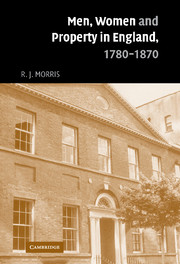 Men, Women and Property in England, 1780–1870
Men, Women and Property in England, 1780–1870 Book contents
- Frontmatter
- Contents
- List of figures
- List of tables
- Acknowledgements
- 1 Joseph Henry Oates: a world of madeira and honey
- 2 In search of the British middle class
- 3 Reading the wills: a window on family and property
- 4 The property cycle
- 5 Strategies and the urban landscape
- 6 Women and things and trusts
- 7 Life after death
- 8 Networks and place
- 9 The economic history of the British middle class, 1816–70
- 10 Conclusion and Epilogue
- Bibliography
- Index
9 - The economic history of the British middle class, 1816–70
Published online by Cambridge University Press: 28 July 2009
- Frontmatter
- Contents
- List of figures
- List of tables
- Acknowledgements
- 1 Joseph Henry Oates: a world of madeira and honey
- 2 In search of the British middle class
- 3 Reading the wills: a window on family and property
- 4 The property cycle
- 5 Strategies and the urban landscape
- 6 Women and things and trusts
- 7 Life after death
- 8 Networks and place
- 9 The economic history of the British middle class, 1816–70
- 10 Conclusion and Epilogue
- Bibliography
- Index
Summary
Some pains have been necessary to present the figures in such a form as may be least likely to lead to erroneous inferences, but all those who are in the habit of using statistics must be aware of the danger of relying upon them without an intimate acquaintance with the sources from which they are derived.
So far, this account of the practices and processes which linked property to the families and individuals of the middle classes has proceeded in terms of the experience of individuals embedded in a variety of family networks. This has been set against the general increase in the availability of material wealth, goods and services over the period, but that increase was uneven both in terms of time and of geographical, social and sectoral distribution. Greater precision is required, especially as the need to sustain material standards and social status in an environment of insecurity and risk has played a key part in explanation. All these factors depended upon the changing abilities of the economy to deliver access to material wealth.
Little attempt has been made to trace the course of the overall economic welfare of the middle classes in a period in which their political and cultural assertiveness was evident in a variety of forms. The nature and timing of this assertion may be disputed amongst historians, but all agree that it was a key feature of British social development.
- Type
- Chapter
- Information
- Men, Women and Property in England, 1780–1870A Social and Economic History of Family Strategies amongst the Leeds Middle Class, pp. 347 - 366Publisher: Cambridge University PressPrint publication year: 2005


